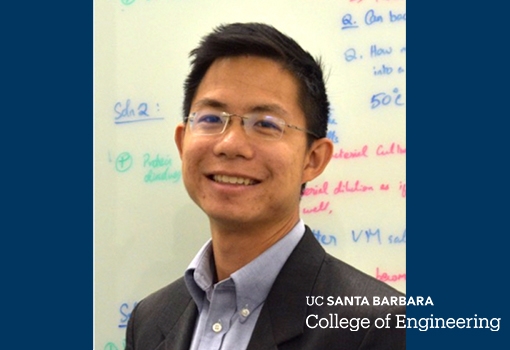Bacteria are extremely energy-efficient organisms that thrive in the harshest of environments. At a moment’s notice, they solve complex problems in order to survive, adapting to changes in conditions and their surroundings.
What if a computing device could be taught to do the same thing, adapting quickly to change? That question is one that Enoch Yeung, an assistant professor in UC Santa Barbara’s Mechanical Engineering Department, is working to answer. He says that researchers in the fields of machine learning, deep learning, neuroscience, and biological computing are developing robust machine learning algorithms and computational devices that can handle sudden transitions in the data they process. Currently, a major capability gap in machine learning is the ability to effectively transfer learn during sudden transitions in data source, type, and quality. Transfer learning is when a model stores knowledge gained while completing one task and applies it to a second task. Yeung believes the key to solving that may lie in learning how bacteria process information and make critical decisions to survive in nutrient-sparse environments.
“Right now, algorithms struggle to keep up with sudden transitions in data. But imagine building a learning algorithm that can adjust on the fly depending on when it receives images and text, or experiences sudden changes in data streams.” said Yeung, who joined UCSB’s faculty in fall 2018 after two years as a senior research scientist in the data science and analytics group at the Pacific Northwest National Laboratory. “Bacteria have been adapting to change for billions of years and may provide clues that could prove useful and lead to generalized computer models that will enable adaptive computations in next-generation computing devices.”
Yeung’s project, “Discovering Fundamental Laws Governing Prokaryotic Adaption in Surface-to-Surface Transitions Using Data-Driven Inverse Modeling,” has garnered support from the U.S. Army Research Office, which awarded him a Young Investigator Award. The Young Investigator Program encourages young faculty to pursue cutting-edge scientific research that is related to national security needs. Winners receive up to $360,000 dispersed over three years to support their work.
“I am deeply grateful to receive this award,” said Yeung, whose runs the Biological Control, Computing, and Learning (BCCL) Laboratory at UCSB. “My lab is broadly focused on understanding and engineering mechanisms for biological control and learning. At the core of both phenomena is a question of what it really means to perform computation. So, we are thrilled to receive this award because it allows us to pursue our core research interests in both biological control and biological learning simultaneously.”
“We are extremely proud of Enoch Yeung for receiving the U.S. Army Young Investigator Award, and we extend him congratulations on this recognition for his creative research on biological computing and synthetic biology,” said Rod Alferness, dean of the College of Engineering. “Enoch continues our strong tradition of junior faculty being recognized for outstanding work, and in doing so, ensures that UCSB engineering remains at the forefront of solving grand challenges with innovative solutions.”
Yeung will approach the problem as a systems biologist, studying the interactions among components in bacteria to determine how they give rise to the function and behavior of particular systems. His group will study the bacteria’s arrangement, or network topology, and basic interaction patterns, known as dynamical motifs. The goal of the project is to discover fundamental computational architectures that are analogous to what drive the phenomena of bacterial adaptation as they move from one surface to another. He describes bacteria as “the ultimate edge-computing device,” comparing its high efficiency to that of an edge-computing device that captures, stores, processes, and analyzes data locally and not in the cloud. Yeung plans to blend high-throughput synthetic biology with inverse modeling, the process of using a set of observations, or the effects, to calculate the causes, or the factors that produced them.
“We're excited to apply a host of machine-learning methods to do this in a data-driven way and see, ultimately, how many architectures we identify that can be used to enrich research in silicon computing,” said Yeung, who received his PhD in Control and Dynamical Systems from the California Institute of Technology. “This award will enable us to discover how bacteria perform computations at the systems level, to adapt and survive in so many different kinds of environments. If we could imbue computers with new bio-inspired architectures that give rise to generalizable adaptive behavior in silicon edge-computing devices, that would usher in a new paradigm for intelligence in edge computing.”
In addition to the Young Investigator Award, Yeung and UCSB materials professor Omar Saleh recently received a three-year, $1 million award from the W.M. Keck Foundation to develop a synthetic, autonomous, gene-regulated proto-cell.

Enoch Yeung, assistant professor of mechanical engineering
